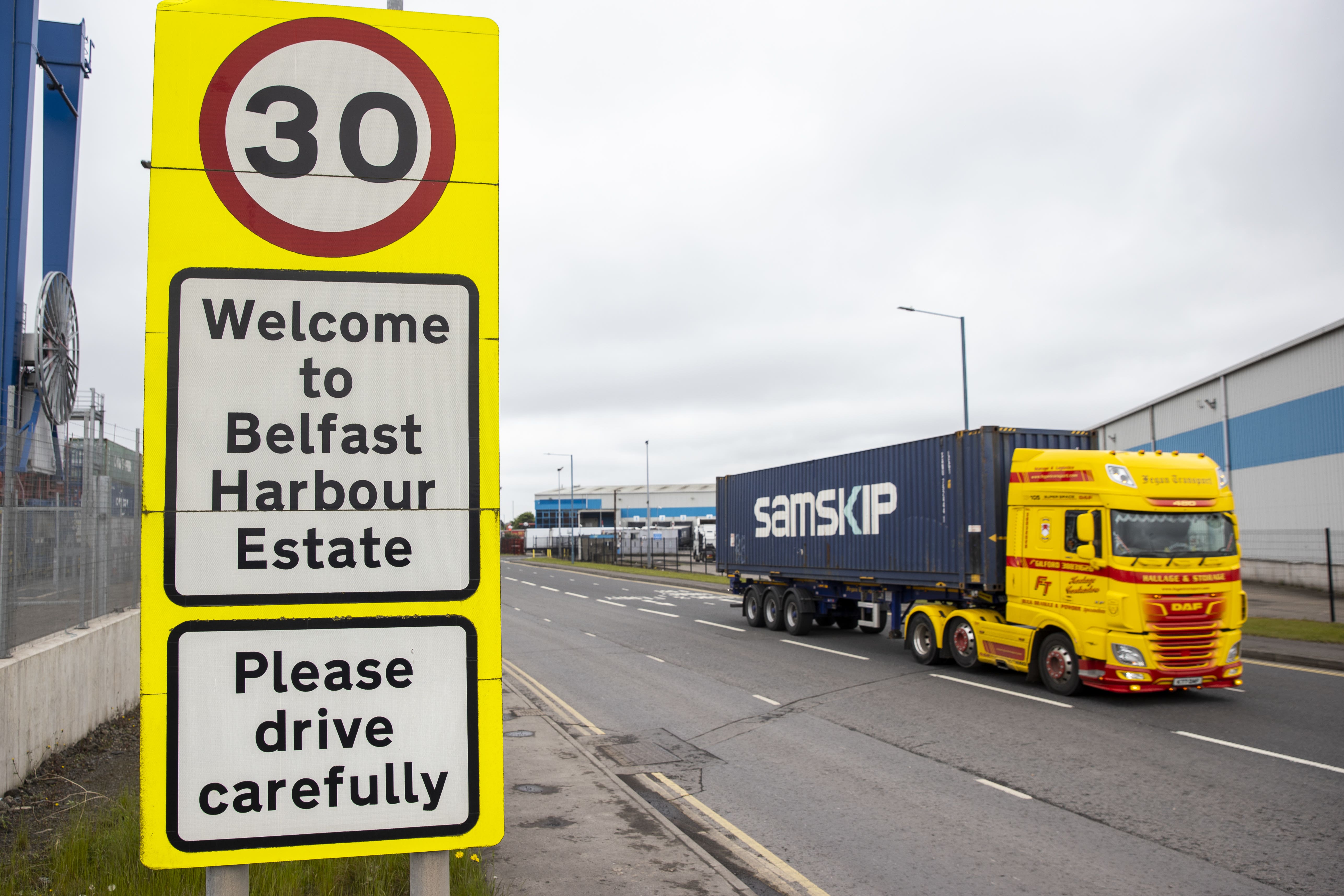Mutual enforcement on post-Brexit trade requires serious consideration – DUP
The pro-Brexit think tank Centre for Brexit Policy has set out proposals to replace the contentious Northern Ireland Protocol.

A system of mutual enforcement on post-Brexit trade by both the UK and EU merits “serious and sustained consideration”, DUP leader Sir Jeffrey Donaldson has said.
The suggested replacement for the Northern Ireland Protocol/Windsor Framework is set out in a report drawn up by pro-Brexit think tank the Centre for Brexit Policy.
The group contends the current arrangements, which involve checks on goods moving from Great Britain to Northern Ireland, have failed and only a radical redrawing of the trading arrangements will be enough to convince the DUP to return to powersharing at Stormont.
The DUP has been blockading devolution in Northern Ireland for more than a year in protest against the protocol.
The party says the Windsor Framework, struck by the EU and UK earlier this year as a way to reduce red tape on trade between GB and NI, does not go far enough.
Sir Jeffrey has made clear the DUP will not return to Stormont until the Government provides further legislative assurances around Northern Ireland’s place within the UK internal market.
The mutual enforcement system would see the UK and EU implement the other’s trading rule and regulations to protect their respective markets.
Under the proposals, UK officials would enforce the laws of the EU in the UK, and EU officials would enforce UK laws inside the single market.
That would see UK exporters to the EU who break EU rules being punished by UK courts, with no role for the European Court of Justice in Northern Ireland, while EU exporters to the UK would be policed by EU officials inside the bloc.
The paper, which has been presented to the UK Government, will be launched at Westminster on Tuesday.
The think tank insists mutual enforcement would address DUP concerns about Northern Ireland’s sovereignty as part of the United Kingdom and still provide for a free flowing border on the island of Ireland.
The stakes are extremely high and this necessitates a willingness on all sides to engage constructively with proposals that could help end the logjam
Sir Jeffrey, who has penned a foreword to the report, said the “corrosive impact” of the protocol has been undeniable.
“The DUP wants to see Stormont back up and running again as soon as possible and on a sound and stable foundation,” he wrote.
“The stakes are extremely high and this necessitates a willingness on all sides to engage constructively with proposals that could help end the logjam and protect our place in the internal market of the United Kingdom.
“Although the DUP has set out criteria against which we will assess any proposal, we have been clear throughout that mutual enforcement is a concept worthy of serious and sustained consideration in terms of delivering a longer-term solution.
“The vast majority of trade from Great Britain is destined for, and remains, within Northern Ireland. There is a negligible risk to the integrity of the EU market.
“Indeed it is hard to find a single reported case of goods crossing the border since 2020 which have been a threat to their Irish and EU consumers – despite many EU rules not having been applied.
“Even where goods are destined for the EU, it seems reasonable that each side could maintain regulatory autonomy whilst enforcing whatever rules the other seeks to impose on only those goods crossing the border.
“In the longer term, this would sustainably address the potential problems caused by the imposition of regulations by an entirely separate regulatory regime and respect our constitutional position as part of the UK.”
David Jones, the deputy chairman of the ERG, has also written a foreword.
“It is clear that the protocol is not a sustainable long-term arrangement,” he said.
“Sooner or later – and preferably sooner – it will have to be replaced by something better.
“This paper presents a workable solution to the problem. Mutual enforcement is an elegant and effective arrangement that respects the sovereignty of the United Kingdom and restores the full place of Northern Ireland in our Union.
“Equally, it protects the integrity of both the EU single market and the UK internal market. It dispenses with the anomalous state of affairs whereby the court of one party to the Withdrawal Agreement has jurisdiction over the other.
“Mutual enforcement, in short, will normalise relations between the UK and the EU, thrown out of kilter by the Northern Ireland Protocol.”
Subscribe to Independent Premium to bookmark this article
Want to bookmark your favourite articles and stories to read or reference later? Start your Independent Premium subscription today.
